Harland Boxwood
/
(Buxus harlandii)
Harland Boxwood (Buxus harlandii)
/

Photo by David J. Stang
CC BY-SA 4.0
Image By:
Photo by David J. Stang
Recorded By:
Copyright:
CC BY-SA 4.0
Copyright Notice:
Photo by: Photo by David J. Stang | License Type: CC BY-SA 4.0 | License URL: https://creativecommons.org/licenses/by-sa/4.0 | Uploader: David Stang | Publisher: Wikimedia Commons | Title: Buxus_harlandii_1zz.jpg | Notes: Uploaded own work with UploadWizard |












Summary
Buxus harlandii, commonly known as Harland Boxwood, is an evergreen shrub native to open woodlands and rocky hillsides in coastal southeast China and Vietnam, including Hong Kong, Guangdong islands, and Hainan. It typically grows to a height of 3-6 feet (1-2 meters) with a similar spread, and is characterized by its small, glossy, dark green leaves and a dense, rounded form. The Harland Boxwood produces inconspicuous, pale green flowers in the spring, which are not particularly showy, but they do attract bees.
Harland Boxwood is valued for its tolerance of heavy pruning and its ability to form dense, compact hedges, making it a popular choice for formal gardens, borders, and topiary. It is also suitable for container gardening and bonsai. This species thrives in well-drained soil, requires minimal maintenance once established, and prefers partial to full shade, although it can tolerate full sun in cooler climates. It is relatively resistant to boxwood blight compared to other boxwood species, but can be susceptible to root rot if overwatered.CC BY-SA 4.0
Harland Boxwood is valued for its tolerance of heavy pruning and its ability to form dense, compact hedges, making it a popular choice for formal gardens, borders, and topiary. It is also suitable for container gardening and bonsai. This species thrives in well-drained soil, requires minimal maintenance once established, and prefers partial to full shade, although it can tolerate full sun in cooler climates. It is relatively resistant to boxwood blight compared to other boxwood species, but can be susceptible to root rot if overwatered.CC BY-SA 4.0
Plant Description
- Plant Type: Shrub
- Height: 4-6 feet
- Width: 4-6 feet
- Growth Rate: Slow
- Flower Color: N/A
- Flowering Season: Spring
- Leaf Retention: Evergreen
Growth Requirements
- Sun: Full Sun, Part Shade
- Drainage: Medium, Slow
Common Uses
Border Plant, Hedges, Low Maintenance, Potted Plant
Natural Habitat
Open woodlands and rocky hillsides
Other Names
Common Names: Harland's Boxwood, Richard's Boxwood, Chinese Boxwood
Scientific Names: Buxus harlandii
GBIF Accepted Name: Buxus harlandii
